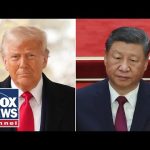China has sharply increased tariffs on American goods to 125%, escalating tensions in the ongoing trade war. This move comes as President Xi Jinping tries to rally European nations against what he calls U.S. “bullying.” The decision shows China’s willingness to fight back against American trade policies, but many conservatives argue it reveals weakness rather than strength.
The Chinese government claims U.S. tariffs violate international trade rules and basic economic principles. They called rising American tariffs “a joke” and threatened to ignore future increases. However, critics point out that China’s own aggressive trade practices have forced the U.S. to take defensive measures to protect American jobs and industries.
President Trump’s administration recently raised tariffs on Chinese imports to 145%, demonstrating a firm stance against unfair trade practices. These policies aim to counter China’s history of intellectual property theft and forced technology transfers. The U.S. approach has drawn praise from workers in manufacturing sectors hit hardest by decades of unbalanced trade.
European stock markets plunged following China’s announcement, with experts warning of heightened recession risks. While Xi seeks European support, many European leaders remain wary of aligning too closely with China’s authoritarian regime. The economic fallout highlights how China’s actions threaten global stability rather than solve trade disputes.
Xi’s outreach to Europe appears desperate as China faces growing economic pressures. The communist regime’s heavy-handed tactics have backfired, causing international skepticism about its “win-win cooperation” claims. Conservative analysts suggest Europe should instead strengthen ties with democratic allies to counter Chinese economic aggression.
The tariff battle underscores China’s reliance on export-driven growth at the expense of fair competition. By refusing to address long-standing trade abuses, Beijing forces America to take stronger protective measures. This pattern reveals the Chinese Communist Party’s unwillingness to play by established international rules.
As the trade war intensifies, many Americans support tough negotiations to secure better deals. Past administrations’ weak approaches allowed China to dominate key industries, but current policies aim to reclaim economic sovereignty. The focus remains on putting American workers and businesses first in all trade agreements.
The coming months will test whether China blinks in this high-stakes confrontation. Conservative leaders emphasize that standing firm against unfair practices protects national interests. While short-term challenges exist, the long-term goal of balanced trade and fair competition remains worth fighting for.




